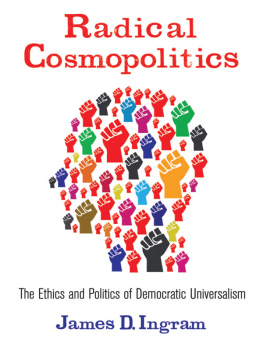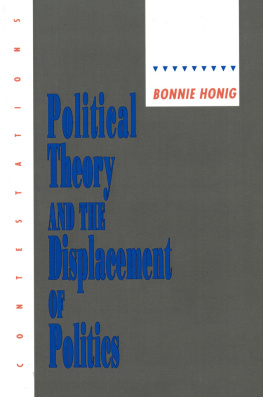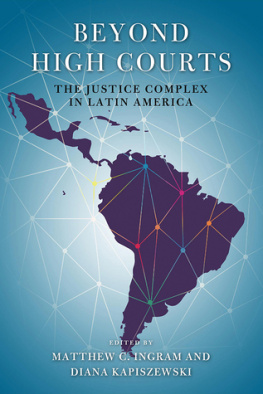Radical Cosmopolitics
NEW DIRECTIONS IN CRITICAL THEORY
NEW DIRECTIONS IN CRITICAL THEORY
Amy Allen, General Editor
New Directions in Critical Theory presents outstanding classic and contemporary texts in the tradition of critical social theory, broadly construed. The series aims to renew and advance the program of critical social theory, with a particular focus on theorizing contemporary struggles around gender, race, sexuality, class, and globalization and their complex interconnections.
Narrating Evil: A Postmetaphysical Theory of Reflective Judgment, Mara Pa Lara
The Politics of Our Selves: Power, Autonomy, and Gender in Contemporary Critical Theory, Amy Allen
Democracy and the Political Unconscious, Nolle McAfee
The Force of the Example: Explorations in the Paradigm of Judgment, Alessandro Ferrara
Horrorism: Naming Contemporary Violence, Adriana Cavarero
Scales of Justice: Reimagining Political Space in a Globalizing World, Nancy Fraser
Pathologies of Reason: On the Legacy of Critical Theory, Axel Honneth
States Without Nations: Citizenship for Mortals, Jacqueline Stevens
The Racial Discourses of Life Philosophy: Ngritude, Vitalism, and Modernity, Donna V. Jones
Democracy in What State? Giorgio Agamben, Alain Badiou, Daniel Bensad, Wendy Brown, Jean-Luc Nancy, Jacques Rancire, Kristin Ross, Slavoj iek
Politics of Culture and the Spirit of Critique: Dialogues, edited by Gabriel Rockhill and Alfredo Gomez-Muller
The Right to Justification: Elements of Constructivist Theory of Justice, Rainer Forst
The Scandal of Reason: A Critical Theory of Political Judgment, Albena Azmanova
The Wrath of Capital: Neoliberalism and Climate Change Politics, Adrian Parr
Social Acceleration: The Transformation of Time in Modernity, Hartmut Rosa
Radical Cosmopolitics
The Ethics and Politics of Democratic Universalism
James D. Ingram
Columbia University Press

New York
Columbia University Press
Publishers Since 1893
New York Chichester, West Sussex
cup.columbia.edu
Copyright 2013 Columbia University Press
All rights reserved
E-ISBN 978-0-231-53641-7
Library of Congress Cataloging-in-Publication Data
Ingram, James D., 1972
Radical cosmopolitics : the ethics and politics of democratic universalism /
James D. Ingram.
pages cm (New directions in critical theory)
Includes index.
ISBN 978-0-231-16110-7 (cloth: alk. paper)
1. Cosmopolitanism. 2. CosmopolitanismPhilosophy. I. Title
JZ1308.1464 2013
306.2dc23 2013002293
Jacket design: Noah Arlow
A Columbia University Press E-book.
CUP would be pleased to hear about your reading experience with this e-book at .
References to Web sites (URLs) were accurate at the time of writing. Neither the author nor Columbia University Press is responsible for URLs that may have expired or changed since the manuscript was prepared.
CONTENTS
Like all attempts to say something about the universal, this book grew out of particular times, places, and conversations. Along the way I have been assisted in ways large and small, direct and indirect, by many people, only a small fraction of whom I can recognize here.
This book was first written as a dissertation at the New School for Social Research. I want to thank my advisors Jay Bernstein and Andreas Kalyvas and especially my supervisor, Nancy Fraser, for her tough questions, timely suggestions, and her wisdom and patience in allowing me to find my own way. I want to thank the Social Sciences and Humanities Research Council of Canada (SSHRC) for supporting the early stages of my doctoral research and the New School for Social Research for its Arnold Brecht dissertation fellowship. I want to thank my New School political theory comrades, especially Kyra Holland, Adam Lupel, Mariela Vargova, and ernesto Verdeja, for their solidarity, as well as my writing companions at Butler Library, especially Alex Gourevitch and Ian Zuckerman, for their fellowship and comments on various drafts. I owe an incalculable debt to Gil Anidjar, Nauman Naqvi, and above all Nermeen Shaikh for their friendship, support, and intellectual stimulation over many years.
I want to thank the Deutscher Akademischer Austauschdienst (DAAD), as well as my sponsor at Potsdam University, Christoph Menke, for making possible an extended stay in Berlin, where the general outlines of this project took shape. Thanks to Rahel Jaeggi, Ina Kerner, Hartmut Rosa, and Martin Saar for making me feel intellectually at home in Berlin; to Arnd Pollmann for listening to my first sketch of the argument (and then suggesting that I write on Hegel instead); and to Robin Celikates and Felix Koch for many years of conversation and feedback on various ideas and eventually drafts.
In my postgraduate years, I want to thank my colleagues at the University of Oregon, especially Joe Lowndes and Priscilla Yamin, for their warm welcome. I have been very fortunate to find a congenial academic home at McMaster University, where I want to thank Robert OBrien, Tony Porter, Peter Nyers, Peter Hallberg, John Seaman, and Catherine Frost. In returning to Toronto, I was lucky to join friends who are also valued interlocutors and readers, notably Phil Triadafilopoulos and Inder Marwah, as well as no doubt my longest-standing Gesprchspartnerin, my sister Susan. I owe a particular debt to Sylwia Chrostowska, without whose support and critical suggestions this book would not have attained its present form.
In the final stretches of this project I benefited from three exceptional opportunities. The first was a workshop on Cosmopolitanism and Postcolonialism at the University of Warwick, for which I am grateful to Gurminder Bhambra, Robert Fine, and John Holmwood. The second was a summer with the University of Frankfurts Justitia Amplificata group. My thanks to Rainer Forst, Stefan Gosepath, and those at the center for their invitation and for creating such a rich academic environment. The third was a workshop by the Groupe de recherche interuniversitaire en philosophie politique de Montral. I want to thank the participants, Delphine Abadie, Ryoa Chung, Jacob Levy, Dominique Leydet, Will Roberts, Hasana Sharpe, and especially Arash Abizadeh and Pablo Gilabert for their hospitality and intellectual generosity.
appeared as What Is a Right to Have Rights? Three Images of the Politics of Human Rights, American Political Science Review 102, no. 4 (2008): 401416. They appear here with permission.
I dedicate this book to my parents.
Throughout its long history the idea of cosmopolitanism has never known such success as in the last two decades. We can postulate four reasons for this. The first was a widespread sense, captured in the word globalization, that the accelerating movements of people, money, goods, technologies, images, and ideas beyond national frontiers had crossed a threshold. Nearly all observers perceived a qualitative change in the way and the extent to which people related to, affected, and depended on one another across borders: the world seemed to be becoming more globalinterconnected, interdependent, and, in this sense, unified. The second, closely related reason for cosmopolitanisms appeal was what seemed like an inexorable rise of multilateralism, international coordination, and global governance. This trend had been widely remarked on earlier under the heading of complex interdependence, but it now emerged as a dominant trend. The third reason, in a sense setting the stage for the first two, was the end of Cold War geopolitical dualism. Even if the euphoria of 1989 faded with the proliferation of new conflicts and inequalities, it remained the case that the world was no longer divided along a single axis. And, emerging from this, was, fourth, the rise of human rights and democracy as a universal language of political justification. While this too began earlier, be it in the 1970s with the Helsinki Accords or even as early as the 1948 Universal Declaration of Human Rights, it peaked in the 1990s. Everyone everywhere now seemed to appeal to the same values, which decisively shunted aside those of socialism and Third World liberation. As on the geopolitical front, competing universalisms (state socialism and liberal capitalism) gave way to one (democracy and human rights), juxtaposed, if at all, to particularistic challengers whose claims were strictly local. The result was an optimism across broad swaths of the commentariat not seen since the end of World War II. Even many of those who were reluctant to see triumph of American-led capitalist liberal-democracy as the end of history nevertheless saw reason for hope in redirecting globalization toward more progressive ends.












 New York
New York